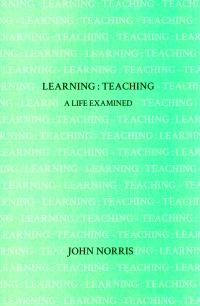| ________________
CM . . . . Volume XVIII Number 22 . . . . February 10, 2012
excerpt:
John Norris, who died recently, was quite a remarkable man. Born in Nelson, BC, in 1922, he became a leading cultural figure in the Slocan Valley, highly respected for his literary output. The author of eight books, including Old Silverton, which won the British Columbia Lieutenant Governor's Award for Historical Writing, Norris was also very well known for his beautiful and extensive garden. The magnificence of this garden can be imagined by anyone who sees a copy of John's Garden, published in 1996 with photographs by Patrizia Menton. Norris is also remembered as an outstanding teacher. His educational philosophy is clearly explained, with numerous practical examples, in Learning: Teaching. In 1965, Norris accepted a teaching post at The Youth Centre in New Denver, a new residential school for what were described as "disturbed" or "delinquent" young teenage boys. It was here that he excelled as a teacher. Realizing that the youths had a very poor regard for authority figures, some of whom had punished them by removing them from their homes for being "bad", Norris did not criticize their behaviour when others might and, as a result, earned their trust. Their appreciation of his understanding was exemplified by their use of the term "Teach" whenever he was addressed. He was an authority figure who respected them, likely the first adult who did. Any teacher of younger children will find inspiration in this book. But Learning: Teaching is not primarily about Norris's career as a teacher. It is in the form of an apology for a life of which, for many years, he was ashamed. He was a gay man, and it took him many years to understand and accept this fact. As a boy, he did not know why he was different from other boys. Sex was not a subject that was discussed in his home, in schools, or in society generally. Homosexuality was even less discussed or understood, so Norris was in a quandary for much of his life. Norris's experiences as a youth and teenager were not quite the same as those of other young people. Everyone matures sexually, often with little or no explanation of what is happening to their bodies. Sex was, and in many homes may still be, a subject rarely, if ever, mentioned. While mothers, by necessity, have to explain what puberty means to their daughters, fathers have less need to do so with their sons. When Norris matured sexually, he did so in a way that was different to other boys, and he was, therefore, deeply puzzled. This difference bothered him a great deal because he did not understand why he was different, and he didn't know to whom he could turn to for help. Norris's confusion did not end until he was in his fifties when he went to see a psychiatrist. It still seemed to him that the way he felt was "something not quite natural". The psychiatrist did, too, and wanted to "go about curing him." The psychiatrist didn't, but, by 1971, Norris had reached the point of accepting his homosexuality while not yet feeling comfortable with it. It is doubtful if he ever was. Learning: Teaching is ideal for class use. There are numerous ways it could be used to deal with the problems facing young people as they grow up. Society's attitude towards sex, both hetero and homosexual, could also be discussed. The experiences of students today could be compared with those of Norris. How should parents deal with the topic of sex is another. Is it still a taboo subject in any homes? Is there discrimination towards gays? It took considerable courage for Norris to write this book and to bare his soul to an audience. Would students who feel different from their peers, as Norris did, have the same kind of courage? In 2009, diagnosed with prostate cancer, Norris was given only a short time to live. He was, however, not ready to die, and between then and the spring of 2011, he wrote Learning: Teaching. More than an apology, it is a confession. Norris, realizing that death was not far away, is seeking absolution from the world, or at least, the readers of this book. It is as if he is confessing to a priest for a life which still caused him shame, and like any good priest, the readers of this most interesting book will, this reviewer feels certain, forgive him, even though this isn't necessary. Recommended. Thomas F. Chambers, a retired college teacher, lives in North Bay, ON.
To comment
on this title or this review, send mail to cm@umanitoba.ca.
Copyright © the Manitoba Library Association. Reproduction for personal
use is permitted only if this copyright notice is maintained. Any
other reproduction is prohibited without permission.
NEXT REVIEW |
TABLE OF CONTENTS FOR THIS ISSUE
- February 10, 2012.
AUTHORS |
TITLES |
MEDIA REVIEWS |
PROFILES |
BACK ISSUES |
SEARCH |
CMARCHIVE |
HOME |
